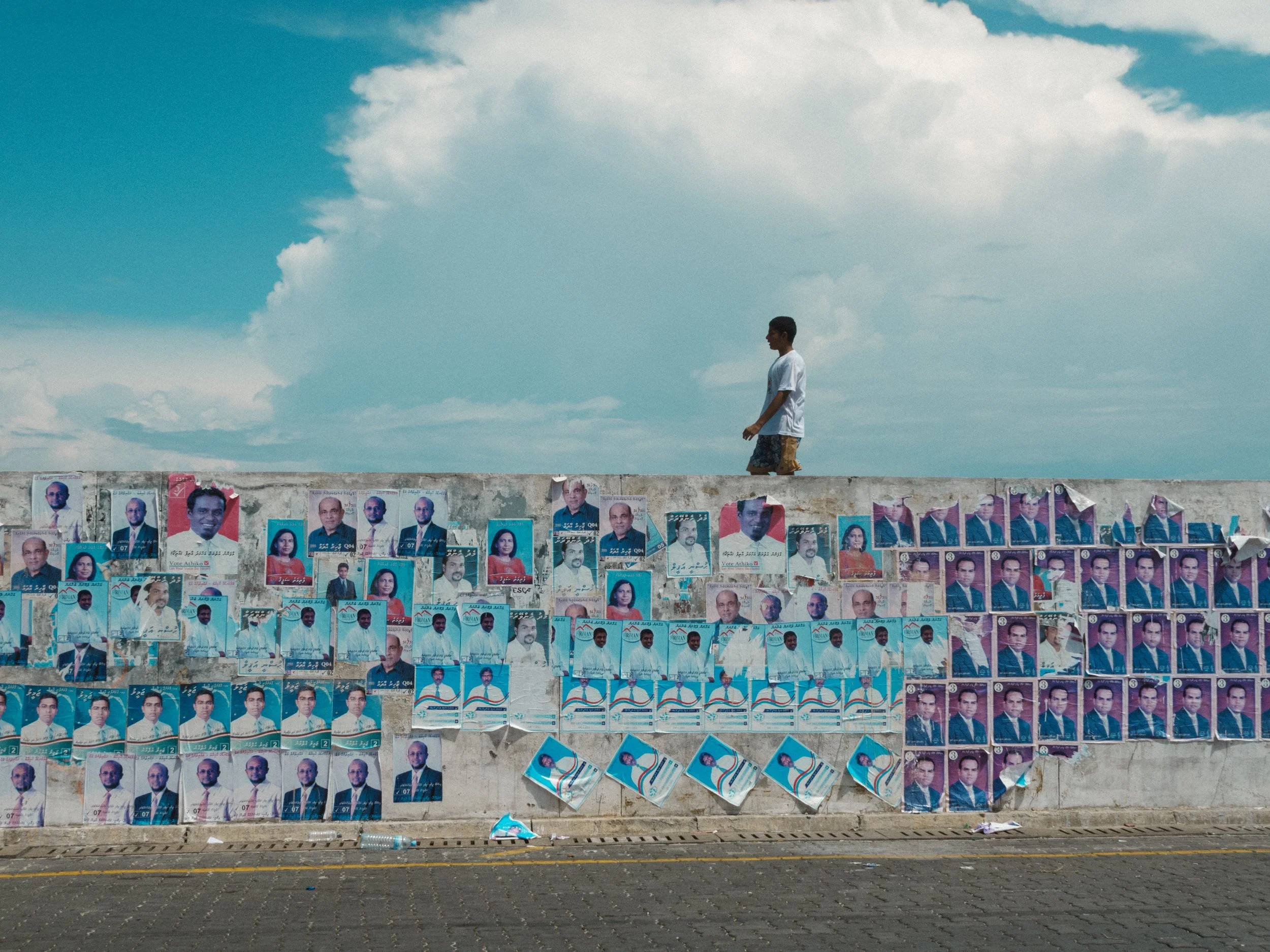Maldives, UPR Report Consideration 2015 - Statement by Dr. Ali Naseer Mohamed
““Let me now turn to the recommendations we received from Member States. As we have stated at the UPR Working Group, for over eight hundred years, Maldivians have embraced and maintained our Islamic values. Islam forms the basis of our Constitution, and all our laws. Any efforts to introduce practices contrary to the values of Islam, will not be entertained by the people of Maldives. Of the sixty recommendations the Government has rejected, and thus taken note of, are mostly those that contradict with the Islamic faith and our Constitution. The people of Maldives, through a democratic process, have rejected freedom of religion, LGBT, and non-traditional forms of family. However, as previously stated, non-Maldivians are allowed to practicetheir own faith in private. We have also provided explanations on the recommendations in the Addendum submitted to the Council.””
What democratic process?
The Maldives refuses to allow basic human rights by using the vague justification of religion. The UN is the greatest circle jerk in the history of humanity. They do not care about your rights as a citizen of this planet, they instead care about the rights of nations. Maldivian minorities will just have to suffer in silence. What other option do we have when the powers that be have failed us? And what greater power could there be on this planet than the United Nations? Does the UN not care at all about Maldivian minorities? Are they simply a myth to them?
The UN website streaming the video didn't even have a link to the transcript, or even closed captioning features. Says a lot really.
Maldivians are encouraged to dream big, but not so big that might dream of something like the freedom to believe in what you wish. Through what "democratic process" (as Dr. Ali Nazeer claims) have we decided all this? Just exactly what "humans rights" education are we talking about here where minorities such as apostates and LGBT are not even given the right to exist?
One thing is clear. The Universal Declaration of Human Rights is utterly meaningless. Why does the document even exist in the first place if autocratic regimes like the Maldives can do with it as they please? What actual protection does it afford the humans of this planet?
The Full statement:
Thank you, Mr.President.
Excellencies, Ladies, and Gentlemen: Good afternoon.
It is a pleasure for me to be back at this esteemed Council, and part of this important meeting to consider the outcome of the Universal Periodic Review of the Maldives, and adopt the Report of the Working Group.
In July this year, the Maldives celebrated its fiftieth anniversary of independence, and three days ago, we celebrated fifty years of membership at the United Nations. These two landmark anniversaries reaffirm our collective will to further continue the journey we began in 1965. It is a journey we embarked on to reform, and to strengthen our system of governance, our institutions, and to improve the livelihood of the peoples.
The Universal Periodic Review process has become a key navigational instrument in our drive for national progress. The Maldives UPR held on 6 May 2015gained nation-wide interest in the Maldives. The Session received wide coverage on national and private news channels, and lively discussions from schools to social media. The engagement and the discussion both positive and critical, has renewed and strengthened the commitment of the Government to this process and its core guiding principles: universality, inclusivity, and transparency. It has reaffirmed our belief in the process’s potential to contribute to the positive and sustainable development of the country.
Mr. President
At the Maldives UPR, we received two hundred and fifty eight recommendations from one hundred and two States. After a careful consideration, the Government of Maldives has accepted one hundred and ninety eight recommendations, and rejected sixty. For a small nation with very limited resources, we hope you appreciate how ambitious we are. But we have never shied away from a challenge: as we said in our closing remarks to this Council on 8May 2015,for us, “small” is neither insignificant not unimportant; . . . small means striving to achieve higher, and dreaming big”.
Mr President
I will now highlight some of the developments on human rights that have taken place in the past four months. The Health Services Bill, the Sports Bill, National Integrity Commission Bill, and the Disaster Management Bill have been ratified.
The New Penal Code has come into effect on 16 July 2015, after a comprehensive roll-out and sensitisation programme was conducted to familiarise the relevant stakeholders with the sweeping changes. Many amendments to legislations have also been ratified, in order to comply with the Constitution of 2008 and the new penal code. These legislative reforms have contributed to the strengthening of the legislative framework around a holistic approach to the promotion and protection of human rights in the Maldives.
On the socio-economic front, the Government has committed to provide 24-hour electricity to all inhabited islands before 2018, a right enshrined in our Constitution. We have also introduced the concept of “Smart city” to the Maldives, and begun efforts to develop a youth city, to cater to the nearly fifty percent of the population that are below the age of twenty-five. In August 2015, the Government has also introduced Islamic Financing loan programme ‘faseyha madhadhu’,which would benefit the small and medium enterprises.
On 17 August2015, the President, on the approval of the Parliament, appointed three new members to the Human Rights Commission of the Maldives to replace the members whose terms completed. The process of appointment was publicly announcedand transparently conducted. Members have also been appointed to the Public Service Media Governing Board, further enhancing the freedom of expression guaranteed by the Constitution.
Mr President
Let me now turn to the recommendations we received from Member States. As we have stated at the UPR Working Group, for over eight hundred years, Maldivians have embraced and maintained our Islamic values. Islam forms the basis of our Constitution, and all our laws. Any efforts to introduce practices contrary to the values of Islam, will not be entertained by the people of Maldives. Of the sixty recommendations the Government has rejected, and thus taken note of, are mostly those that contradict with the Islamic faith and our Constitution. The people of Maldives, through a democratic process, have rejected freedom of religion, LGBT, and non-traditional forms of family. However, as previously stated, non-Maldivians are allowed to practicetheir own faith in private. We have also provided explanations on the recommendations in the Addendum submitted to the Council.
The Government has developed a comprehensive strategy for implementing the one hundred and ninety eight recommendations we have accepted. Under the guidance of President Abdulla Yameen Abdul Gayoom, the Ministry of Foreign Affairs will continue to be the principal agency coordinating the implementation of the recommendations. And we have already started the consultations. Following informal meetings, the reconstituted Standing Committee of the UPR has held its first formal meeting on 20 August 2015. The new Standing Committee has 8members from the Government, and 4members from civil society organisations. We have taken a results-based approach in implementing the recommendations by identifying measurable and verifiable benchmarks.
President Yameen’s Government believes that human rights are not only about international instruments or pieces of law. Human rights is as much about cultivating respect, nurturing belief, and in making human rights a way of life. To promote these values, the Government will continue its efforts to provide human rights education.
Mr President,
For a Small Island Developing State, with numerous challenges such as lack of expertise, capacity, technical and financial limitations, we remain constrained in our efforts to achieve the legislative reforms needed, at the pace we want.
New legislations such as the Gender Equality Bill will be presented to the next Parliament session, and there are many others in the pipeline. The adverse impacts of climate change is, and will undoubtedly pose new challenges to the realisation of the human rights of our small population, scattered over a large expanse of the ocean. Similar to many other countries, our societies have not been immune to the waves of drug abuse and radical extremism spreading across the globe.
We have been very forthcoming about our limitations. We have exercised maximum transparency in highlighting the challenges we encounter. We have never claimed we are perfect. And indeed, no country can legitimately claim to have a perfect record.
Despite the challenges, the progress that the Maldives has achieved only within a span of ten years, is by any measure, impressive. It is therefore highly unfortunate that there are several forces, both outside and within, trying to reap the benefits of our political vulnerability. It is also unfortunate that the Maldives, our governance system that is only a decade old, is often judged by the same yardstick used for countries that took centuries to establish. And while the attention is appreciated, conclusive evidence shows that change is only sustainable if locally owned, locally driven, and locally shaped. Institutions need to have the space and time to grow organically according to the specific needs of the people of the country.
Having said that, we always come to this Council with an open mind, and an attentive ear. We have much to learn from the experiences of other States, and well meaning, well intended advise is well received. We count on the support of our partners to help us reach our goals, and especially in implementing the recommendations received at this Council. We would like to hear from your experiences, on how best we can tackle some of the challenges we face. As my Foreign Minister Dunya Maumoon stated at the UPR Working Group in May, “we are here with a sincere intent to listen, to engage”, to share our experiences, to be guided by yours.
With this in mind, I would like to request the President to open the floor, and I look forward to a fruitful discussion.
Thank you MrPresident.
A password for UN extranet access can be obtained without much hassle from:
http://www.ohchr.org/EN/HRBodies/HRC/Pages/HRCRegistration.aspx










